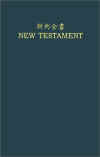 |
Chinese and
English New
Testament.
Bilingual
edition. Union
Version (Shangdi
edition) and
Revised Standard
Version English
text. -
Hardcover. (5-1/4
x 7-1/2 in.)
From Wikipedia,
the free
encyclopedia
Shangdi
(上帝,
pinyin:
Shàngdì,
Wade-Giles
Shang Ti),
literally
translated,
"Above
Sovereign",
"Above
", or
"Lord On
High",
in
Chinese
culture,
is the
name
used
both in
traditional
Chinese
religion
as well
as in
Chinese
Christianity
for the
Supreme
Deity.
Chinese
terms
for God,
especially
a
"Supreme
God",
have
produced
many
variations
for the
title.
The
oldest
records
of the
term
Westerners
translate
as
"God",
"Most
High
God",
"Greatest
Lord"
appear
to exist
in the
earliest
documents
of
Chinese
literature
as
Shangdi
(上帝,
pinyin:
Shàngdì,
literally
"Above
Emperor").
This
representation
may be
as old
as 2000
BC or
older,
with the
earliest
documentation
around
700 BC.
However,
as
Chinese
religion
changed
to
incorporate
later
interperatations
of
Confucianism,
Daoism,
&
Buddhism,
the term
seems to
have
merged,
in the
views of
some
philosophers,
with an
impersonal
Tian, or
heaven.
(See
Shangdi,
Pangu,
Tian,
and
Chinese
Mythology,
for
examples
and
details.
The
English
Standard
Version
(ESV)
is an
English
translation
of the
Bible.
The
first
edition
was
published
in
2001
by
Crossway
Books,
a
division
of
Good
News
Publishers,
which
also
owns the
copyright
to the
text.
|

